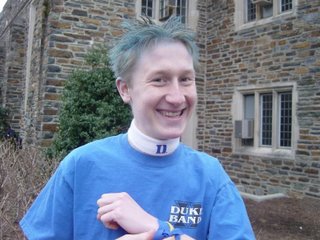Is it even less fair when less qualified applicants get into a University because they are rich?
That is what happens at Duke.
Despite her boarding-school education and a personal tutor, Maude Bunn's SAT scores weren't high enough for a typical student to earn admission to Duke University.
But Ms. Bunn had something else going for her -- coffeemakers. Her Bunn forebears built a fortune on them and, with Duke hoping to woo her wealthy parents as donors, she was admitted.
Duke bends admissions standards to make space for children from rich or influential families that lack longstanding ties to the University. Through referrals and word-of-mouth, Duke identifies applicants from well-to-do families. Then, as soon as these students enroll, Duke starts soliciting gifts from their parents.
The formal practice of giving preference to students whose parents are wealthy is called "development admits". Duke has been particularly aggressive in snaring donors through admissions breaks. Widely considered one of the nation's top ten universities, Duke accepts 23% of its applicants and turns down more than 600 high-school valedictorians a year. Three-fourths of its students score above 1320 out of a perfect 1600 on the SATs.
Yet in recent years, Duke says it has relaxed these standards to admit 100 to 125 students annually as a result of family wealth or connections, up from about 20 a decade ago. These students aren't alumni children and were tentatively rejected, or wait-listed, in the regular admissions review.
The strategy appears to be paying off. For the last six years, Duke says it has led all universities nationwide in unrestricted gifts to its annual fund from nonalumni parents.
 Students admitted for development reasons are held to the same lesser standard as some top athletes; not whether they can excel, but whether they can graduate.
Students admitted for development reasons are held to the same lesser standard as some top athletes; not whether they can excel, but whether they can graduate.The system at Duke works this way: Through its own network and names supplied by trustees, alumni, donors and others, the development office identifies about 500 likely applicants with rich or powerful parents who are not alumni. (Children of major alumni donors are given similar preference in a separate process.) It cultivates them with campus tours and basic admissions advice; for instance, applying early increases their chances. It also relays the names to the admissions office, which returns word if any of the students forget to apply -- so development can remind them.
The development office then winnows the initial 500 into at least 160 high-priority applicants. Although these names are flagged in the admissions-office computer, admissions readers evaluate them on merit, without regard to family means. About 30 to 40 are accepted, the others tentatively rejected or wait-listed. During an all-day meeting in March, Mr. Guttentag and John Piva Jr., senior vice president for development, debate these 120 cases, weighing their family's likely contribution against their academic shortcomings.
Once these children of privilege enroll, the development office enlists their parents as donors and fund raisers.
Cissy Bunn acknowledges her daughter didn't fit the academic profile of a Duke student. "She's bright, she had good grades, but she doesn't meet the superstar status," Mrs. Bunn says. "Did my normal child take the place of somebody who could really make a difference in the world? Sure, yes, to an extent. But there are so many things you can lose sleep over. I'm happy for me and my child."
5 comments:
Is the picture of Maude? She is a looker, now!
No that is not Maude, just a typical Duke student.
I would be the last person on earth to defend Dook, so don't take this as a defense, but don't all private colleges and universities do this to some extent? For example, I'm sure Ross Perot's dumb kid with big ears could get into Stanford, Harvard, University of Arkansas, or wherever s/he wanted.
I know first-hand that Ross Perot's good looking, non-big-eared, daughter, Katherine, went to a public university.
Bad example, I guess. Jenna Bush could have gone to Princeton, Yale, or Duke if she wanted to and may very well be the first female president since she seems to share all of the traits that made her father qualified for the office (likes to party, lineal descendant of George HW Bush).
Post a Comment